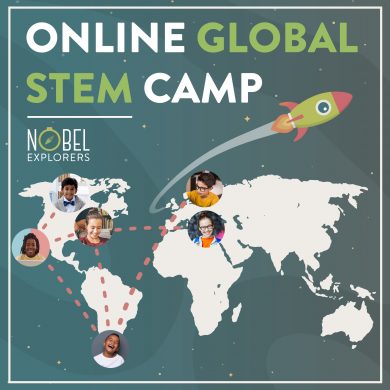Advantages to Working and Learning in a Global Team
Cosmin R. is the project lead and gamification expert for Nobel Explorers. He is the person behind Nobel’s system that rewards students with badges and allows them to track their progress. Cosmin also uses his game design expertise to teach Explorers how to make their own board game. He shares his personal experiences working in a global team and talks about the advantages of having teammates all over the world.
Question: Could you tell us a little bit about your own experiences working in global teams?
Cosmin: I consider myself very lucky because I’ve had plenty of opportunities to experience global teamwork environments. My first IT company had headquarters across the world in places like Canada, the U.S., and in Romania as well, which is where I’m from. It was an opportunity to communicate and work directly with people who shared my area of expertise. I had similar experiences at an international student NGO and while working on many different projects that also depended on the productivity of global teams.
Last but not least, I found my dream job by joining Nobel Explorers, since it allowed me to combine two of my biggest passions: education and gamification. Not only that, but I get to work with people from all over the world in a modern environment while contributing to the education of the next generation of students.
All of my experiences working in international teams have inspired me to seek out these characteristics in my career choices. I’m always looking forward to exploring global teamwork environments, which is one of the reasons I’ve applied to volunteer at the 2020 Summer Olympics in Tokyo.
Q: Let’s start with some basics and discuss the characteristics of a global team. What is a global team exactly?
C: Well, you can think of it like this. Global teams are like teams, only global. 🙂
All jokes aside, global teams are not that different from any other team. They’re defined by the fact that they include people from different places around the world. The foundation of the concept is still a team, while global is something that embellishes and adds value to the initial idea. In their essence, teams are teams, no matter where people come from.
Q: Based on your experience, what would you say are some of the biggest benefits of working in a global team?
C: It’s exciting for many reasons. For starters, you get to know and work with top talent from all over the world. You get to meet experts from your domain selected from a global pool, not just those from your local area.
Take my current situation at Nobel as an example. I’m working alongside a hard-skills expert from Serbia, all the while consulting with a leadership and teamwork-skills expert based in the Philippines. With the introduction of global teams, borders and geographical distance are no longer an obstacle.
Working in global teams gives you a much clearer and more realistic view of the world and it’s a great way of overcoming cognitive biases. You learn that the world is not as scary as it might seem if you only experience it through the eyes of the media. Having international colleagues encourages the development of a positive mindset.
Another thing is that social interactions in global teams often result in friendships and it’s pretty obvious why having friends all over the world is great. For example, during my student years, I was able to organize a cross-Europe trip, going from one country to the next, only visiting friends. This is precisely what our Explorers look forward to when they finish one of our projects. Many of them have mentioned that they can’t wait to visit their teammates and meet with them in person.
JOIN A GLOBAL TEAM AND DEVELOP ESSENTIAL SKILLS FOR SUCCESS!
Your New Friends Are Waiting!
Registration is OPEN!
Lastly, I believe global teams are the future. Looking at some current trends in the business world and the way technology is evolving, it’s pretty clear that working remotely alongside internationals from all over the world is becoming the standard. It’s the next stage in humanity’s progress and something we can look forward to in the years to come.
Q: Considering the other side of the coin. Do you think there might be some disadvantages or challenges related to working in a global team? Are there ways to overcome them?
C: Global teams are primarily affected by challenges common to all teams. I’d say 90% of the issues simply derive from the fact you’re working as part of a group.
Having said that, there are some challenges specifically related to the “global” aspect. Globally distributed teams are definitely affected purely by the physical obstacle of not being able to share the same room. These challenges have been overcome by advancements in technology, meaning every team would need to have a proper tech setup. Additional benefits can be achieved if team members adhere to an online etiquette, like the one we teach in Nobel Explorers projects.
There are some communication barriers. For instance, some words in different social contexts can have more or less different meanings, so that can sometimes cause confusion within a team. Other misunderstandings could arise from cultural differences. By exploring and learning about these differences, we’re both preventing these misunderstandings and also broadening our perspective.
In the end, every healthy team develops a culture of its own, which concerns things like work environment, values, etiquette, and so on. Building a company culture unites team members and if developed properly, it’s also a great way to overcome cultural barriers.
Q: You mentioned that these teams need to have a proper tech setup. What are some of the tools and software you’ve used to ensure the productivity of a global team?
C: I’ve worked with and tested a lot of different tools and apps. One of the main things you’ll need in terms of software is something that will enable you a face-to-face interaction. My top three picks would be Google Meets, Skype, and Zoom. Another essential tool is Google Calendar for planning and organization of work. Working in different time-zones can be tricky and using an online calendar is a great way to overcome potential issues.
For written communication and document sharing, you’ll need an email service, such as Google Suite. You can take things to the next level by adapting to a collaboration hub like Slack or something similar. These collaboration tools are very valuable for project management because they allow everyone to stay up to date with their tasks and the overall work of the entire team.
Q: What are some basic principles of global team communication and how can we make sure it’s effective?
C: In order to properly function in a global team, each person needs to develop certain communication skills. They are numerous and each of them contributes to effective communication within the team. Some of these skills include things like asking verifying questions, demonstrating that you understand what others are saying, conveying a level of certainty regarding your statement, and even asking people who are quiet to speak up. There are lots of things you can do about improving communication and practice is key.
PRACTICE COMMUNICATION SKILLS WITH OUR EXPERT COACHES!
Schedule a FREE Consultation!
At Nobel Explorers, we use a talent tree to track the progress of our Explorers and make sure they’re developing the right skills, both technical like coding, and entrepreneurship, as well as teamwork and leadership skills. One of the branches focuses exclusively on communication, especially in a virtual environment, since all of our projects are done online and in real time.
Q: What are your thoughts on leadership in global teams? Could you share some tips on how to lead a successful global team?
C: Whether you’re going to be a good leader or not will depend on most of the aspects of global teams we’ve already discussed like communication, culture, and etiquette. So dealing with these aspects and optimizing them will be an important part of your responsibilities.
I would say that the basic principles of leadership work for all teams, including global ones. My advice would be to stick to the basics and you’ll do great. Ensure that you’re focused on the right question and that you have a common understanding of the problem. Listen to your team members and ask for their feedback. Empower them to give their best and create a setting where it’s OK to make mistakes.
Q: How can children who have signed up for Nobel Explorers benefit from working in global teams?
C: Online learning itself is a great opportunity but one of its main challenges is that people struggle to keep their motivation. For instance, did you know that only 10% of people who enroll actually finish an online course? So the vast majority of people drop out and it’s mostly because they’re not engaged enough and they’ve lost the initial drive that led them to sign up in the first place.
The fact that our Explorers get to work in a global team reduces their chances of quitting on many different levels. When they work together, they form a bond among themselves and build a sense of responsibility towards each other. They become aware that by leaving the project they’ll also be abandoning their friends and damaging their work. And when things get tough, they’re not alone. They share the bad and pick each other up. It’s an amazing thing to witness first hand.
We’ve also incorporated many different features and methods that increase the motivation of students and allow them to stay engaged throughout the course. They get to work on projects they chose themselves, so that way they’ll surely be working on something they really find interesting. One reason people quit is they get frustrated and can’t overcome a challenge. Each project has a team of expert instructors who are there to help students whenever they get stuck and encourage them to see the project through. Finally, when they finish the project, they have a tangible product with real-life value to look forward to.
The proof that our approach works is in the stories of our Explorers who’ve kept working on their product even after the course is done. It’s very fulfilling to see them wanting to improve their product further and continue working together.
I wish I had had the chance to work in global teams when I was a kid. Meeting cool people from across the world and working on projects I was actually interested in would have been a truly exceptional experience. But I’m also very glad I get to contribute to the cause and help open up opportunities for kids everywhere.





Leave a Reply
Want to join the discussion?Feel free to contribute!